- Clone
- MAb11 (See other available formats)
- Regulatory Status
- RUO
- Other Names
- Tumor necrosis factor-α, Cachectin, Necrosin, Macrophage cytotoxic factor (MCF), Differentiation inducing factor (DIF), TNFSF2
- Isotype
- Mouse IgG1, κ
- Ave. Rating
- Submit a Review
- Product Citations
- publications
| Cat # | Size | Price | Save |
|---|---|---|---|
| 502901 | 50 µg | ¥18,260 | |
| 502902 | 500 µg | ¥51,700 |
TNF-α is secreted by macrophages, monocytes, neutrophils, T cells, and NK cells. Many transformed cell lines also secrete TNF-α. Monomeric human TNF-α is a 157 amino acid protein (non-glycosylated) with a reported molecular weight of 17 kD. TNF-α forms multimeric complexes; stable trimers are most common in solution. A 26 kD membrane form of TNF-α has also been described. TNF-α binding to surface receptors elicits a wide array of biological activities including: cytolysis and cytostasis of many tumor cell lines in vitro, hemorraghic necrosis of tumors in vivo, increased fibroblast proliferation, and enhanced chemotaxis and phagocytosis in neutrophils.
Product DetailsProduct Details
- Verified Reactivity
- Human
- Reported Reactivity
- Cat, Chimpanzee, Baboon, Cynomolgus, Rhesus, Pigtailed Macaque, Sooty Mangabey, Pig
- Antibody Type
- Monoclonal
- Host Species
- Mouse
- Immunogen
- E. coli-expressed, recombinant human TNF-α
- Formulation
- Phosphate-buffered solution, pH 7.2, containing 0.09% sodium azide.
- Preparation
- The antibody was purified by affinity chromatography.
- Concentration
- 0.5 mg/mL
- Storage & Handling
- The antibody solution should be stored undiluted between 2°C and 8°C.
- Application
-
ELISA - Quality tested
CyTOF® - Verified
FC, ICFC, ICC, IHC, Neut - Reported in the literature, not verified in house - Recommended Usage
-
Each lot of this antibody is quality control tested by ELISA assay. For ELISA capture applications, a concentration range of 0.25 - 1.0 µg/mL is recommended. To obtain a linear standard curve, serial dilutions of TNF-α recombinant protein ranging from 500 to 4 pg/mL are recommended for each ELISA plate. It is recommended that the reagent be titrated for optimal performance for each application.
- Application Notes
-
ELISA or ELISPOT Detection: The biotinylated MAb11 antibody is useful as the detection antibody in a sandwich ELISA or ELISPOT, when used in conjunction with the purified MAb1 antibody (Cat. No. 502802/502804) as the capture antibody.
Flow Cytometry3,5,6,10: The fluorochrome-labeled MAb11 antibody is useful for intracellular and membrane-bound immunofluorescent staining and flow cytometric analysis to identify TNF-a-producing cells within mixed cell populations.
Additional reported applications (for the relevant formats) include: neutralization1,2, immunohistochemical staining of paraformaldehyde-fixed, saponin-treated frozen tissue sections4 and acetone-fixed frozen tissue sections8, immunocytochemistry7, and immunofluorescence9. The MAb11 antibody can neutralize the bioactivity of natural or recombinant TNF-a.
Note: For testing human TNF-a in serum or plasma, BioLegend's ELISA Max™ Sets (Cat. No. 430201 to 430206) are specially developed and recommended. The LEAF™ purified antibody (Endotoxin <0.1 EU/µg, Azide-Free, 0.2 µm filtered) is recommended for neutralization of human TNF-a bioactivity (Cat. No. 502922).
The Purified MAb1 antibody is useful in neutralization2 and as the capture antibody in a sandwich ELISA or ELISPOT assay, when used in conjunction with the biotinylated MAb11 antibody (Cat. No. 502904/502914) as the detecting antibody.
Clone MAb11 cross-reacts to Cat11 -
Application References
(PubMed link indicates BioLegend citation) -
- Rathjen D, et al. 1991. Mol. Immunol. 28:79. (Neut)
- Ablamunits V, et al. 2010. Eur. J. Immunol. 40:2891. (Neut)
- Enr quez J, et al. 2002. Adv. Perit. Dial. 18:177. (ICFC)
- Andersson U, et al. 1999. Detection and quantification of gene expression. New York:Springer-Verlag. (IHC)
- Chen H, et al. 2005. J. Immunol. 175:591. (ICFC)
- Iwamoto S, et al. 2007. J. Immunol. 179:1449. (ICFC) PubMed
- Andersson U, et al. 2000. J. Exp. Med. 192:565. (ICC)
- Moormann AM, et al. 1999. J. Infect. Dis. 180:1987. (IHC)
- Zhao XJ, et al. 2003. J. Immunol. 170:2923. (IF)
- Rieger R, et al. 2009. Cancer Gene Ther. 1:53-64. (FC)
- Maksaereekul S, et al. 2009. Vaccine. 28:3754 (FC)
- Product Citations
-
- RRID
-
AB_315253 (BioLegend Cat. No. 502901)
AB_315253 (BioLegend Cat. No. 502902)
Antigen Details
- Structure
- TNF superfamily; dimer/trimer; 17 kD (Mammalian)
- Bioactivity
- Paracrine/endocrine mediator of inflammatory and immune functions; selectively cytotoxic for transformed cells; chemoattractant
- Cell Sources
- Activated monocytes, neutrophils, macrophages, T cells, B cells, NK cells, LAK cells
- Cell Targets
- Monocytes, neutrophils, macrophages, T cells, fibroblasts, endothelial cells, osteoclasts, adipocytes, astroglia, microglia
- Receptors
- TNFRSF1A (TNF-R1, CD120a, TNFR-p60 Type β, p55); TNFRSF1B (TNF-R2, CD120b, TNFR-p80 Type A, p75)
- Cell Type
- Neutrophils, Tregs
- Biology Area
- Cell Biology, Immunology, Innate Immunity, Neuroinflammation, Neuroscience
- Molecular Family
- Cytokines/Chemokines
- Antigen References
-
1. Fitzgerald K, et al. Eds. 2001. The Cytokine FactsBook. Academic Press, San Diego.
2. Beutler B, et al. 1988. Annu. Rev. Biochem. 57:505.
3. Beutler B, et al. 1989. Annu. Rev. Immunol. 7:625.
4. Tracey K, et al. 1993. Crit. Care Med. 21:S415. - Regulation
- Type II integral membrane protein processed by TACE for secretion; upregulated by interferons, IL-2, GM-CSF, substance P, bradykinin, PAF, immune complexes, cyclooxygenase; downregulated by IL-6, TGF-β, vitamin D3, prostaglandin E2, PAF antagonists
- Gene ID
- 7124 View all products for this Gene ID
- UniProt
- View information about TNF-alpha on UniProt.org
Related FAQs
Other Formats
View All TNF-α Reagents Request Custom ConjugationCustomers Also Purchased
Compare Data Across All Formats
This data display is provided for general comparisons between formats.
Your actual data may vary due to variations in samples, target cells, instruments and their settings, staining conditions, and other factors.
If you need assistance with selecting the best format contact our expert technical support team.
-
APC anti-human TNF-α
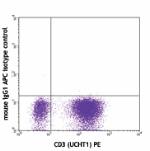
PMA/ionomycin-stimulated (6 hours) human peripheral blood ly... 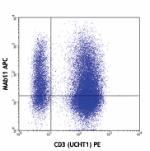
PMA/ionomycin-stimulated (6 hours) human peripheral blood ly... -
Biotin anti-human TNF-α
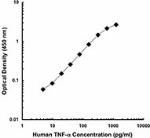
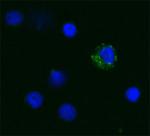
Human PBMCs, stimulated with 1 µg/mL of LPS for 8 h and trea... -
FITC anti-human TNF-α
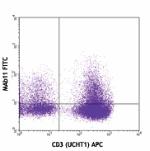
PMA/ionomycin-stimulated (6 hours) human peripheral blood ly... -
PE anti-human TNF-α

PMA/Ionomycin-stimulated human PBMCs were stained with CD3 P... -
Purified anti-human TNF-α
-
Alexa Fluor® 488 anti-human TNF-α
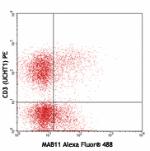
PMA+ionomycin-stimulated (6 hours) human peripheral blood ly... -
Alexa Fluor® 647 anti-human TNF-α
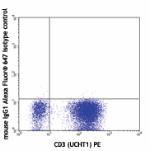
PMA/ionomycin-stimulated (6 hours) human peripheral blood ly... 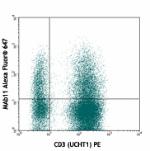
PMA/ionomycin-stimulated (6 hours) human peripheral blood ly... -
Alexa Fluor® 700 anti-human TNF-α
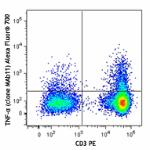
PMA+ionomycin-stimulated (6 hours) human peripheral blood ly... 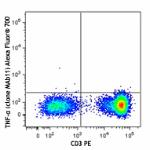
-
Pacific Blue™ anti-human TNF-α
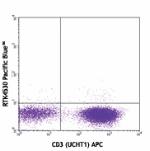
PMA/ionomycin-stimulated (6 hours) human peripheral blood ly... 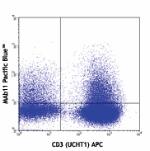
PMA/ionomycin-stimulated (6 hours) human peripheral blood ly... -
PerCP/Cyanine5.5 anti-human TNF-α

PMA+ionomycin stimulated (6 hours) human peripheral blood ly... -
PE/Cyanine7 anti-human TNF-α

PMA+ionomycin-stimulated (6 hours) peripheral blood lymphocy... -
Brilliant Violet 421™ anti-human TNF-α
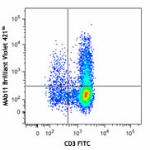
PMA+ionomycin stimulated (6 hours) human peripheral blood ly... 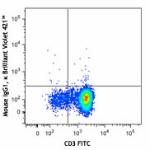
-
Brilliant Violet 605™ anti-human TNF-α
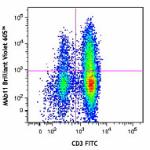
PMA+ionomycin stimulated (6 hours) human peripheral blood ly... 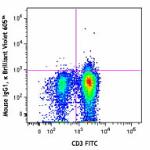
-
Brilliant Violet 650™ anti-human TNF-α
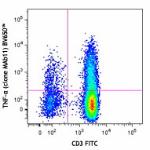
PMA+ionomycin-stimulated (6 hours) human peripheral blood ly... 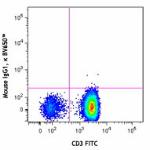
-
Brilliant Violet 711™ anti-human TNF-α
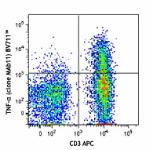
PMA+ ionomycin-stimulated (6 hours) human peripheral blood l... 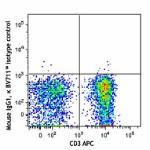
-
APC/Cyanine7 anti-human TNF-α

PMA+ionomycin-stimulated (6 hours) human peripheral blood ly... -
Purified anti-human TNF-α (Maxpar® Ready)
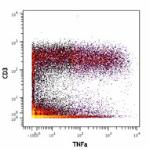
Human PBMCs were incubated for 6 hours in media alone (botto... 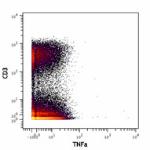
-
PE/Dazzle™ 594 anti-human TNF-α
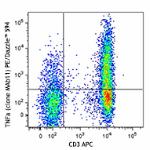
PMA+ionomycin stimulated (6 hours) human peripheral blood ly... 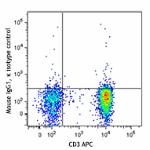
-
Brilliant Violet 785™ anti-human TNF-α
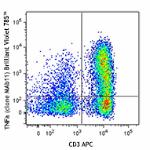
PMA + ionomycin stimulated (six hours) human peripheral bloo... 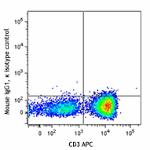
-
Brilliant Violet 510™ anti-human TNF-α
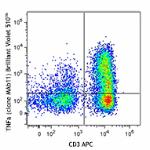
PMA + ionomycin stimulated (six hours) human peripheral bloo... 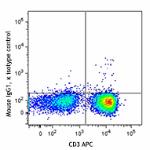
-
PerCP anti-human TNF-α
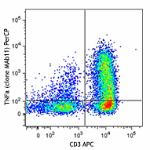
PMA + ionomycin stimulated (six hours) human peripheral bloo... 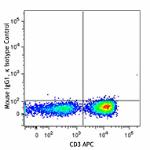
-
PE anti-human TNF-α
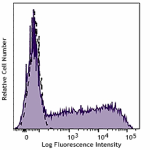
PMA + Ionomycin with Brefeldin A stimulated (4-hour) human ... -
Spark Blue™ 515 anti-human TNF-α

PMA+ ionomycin stimulated (5 hours) human peripheral blood l... -
Spark UV™ 387 anti-human TNF-α

PMA+ionomycin-stimulated (6 hours) human peripheral blood ly... -
TotalSeq™-B0945 anti-human TNF-α
-
Brilliant Violet 750™ anti-human TNF-α

PMA + lonomycin stimulated (6 hours) human peripheral blood ... -
APC/Fire™ 810 anti-human TNF-α

Human peripheral blood lymphocytes were stimulated with (lef... -
GMP PE anti-human TNF-α

PMA + Ionomycin with Brefeldin A stimulated (4-hour) human p...






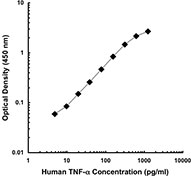
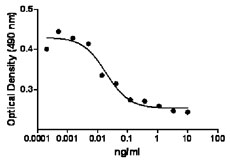





Follow Us